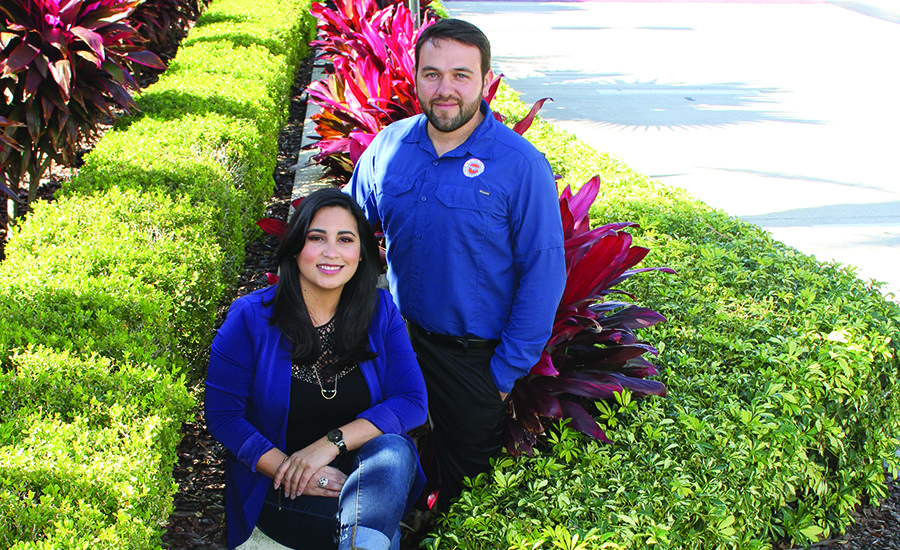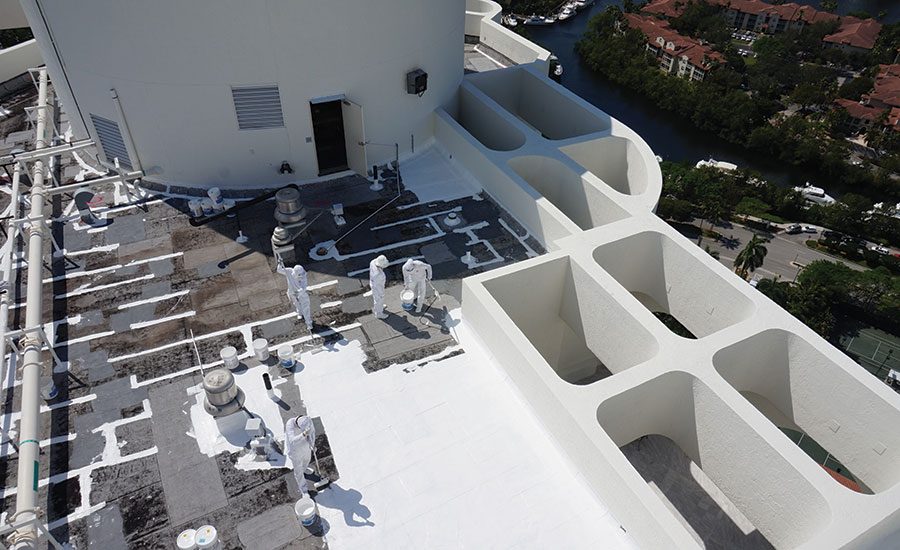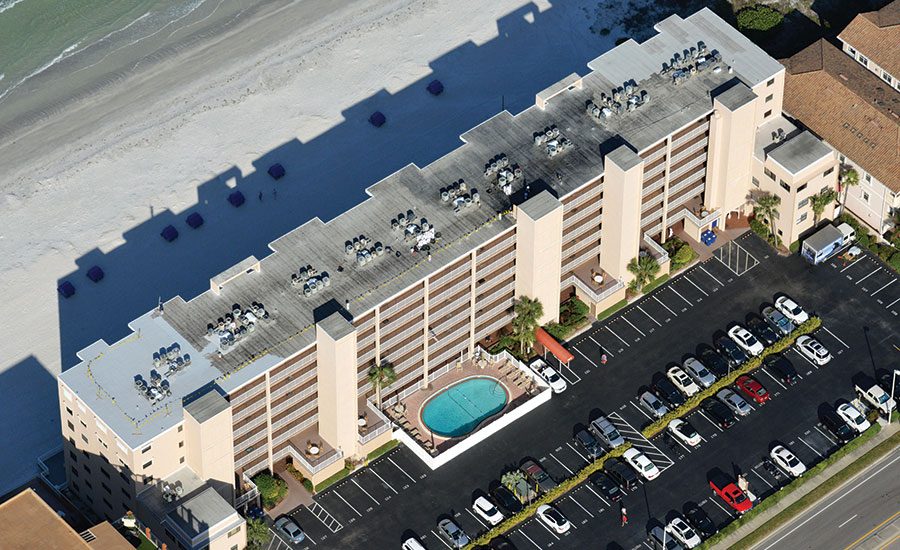Florida Quality Roofing is Driven by a Young Team Roofing the Old-Fashioned Way

Photo by Karen McConnell.

Florida Quality Roofing received a second place Spotlight Trophy for the Advancement of Roofing (STAR) award in the sustainability category for this silicone roof restoration project in Aventura, Fla. at the 94th Annual FRSA Convention in June. Photos courtesy of Florida Quality Roofing.



Florida Quality Roofing received the first place Spotlight Trophy for the Advancement of Roofing (STAR) award in the unique category for this silicone roof restoration of a condominium complex in Tampa, Fla. in 2016. “What we’ve done in the last five years is move into a niche market where we serve a particular segment that’s often ignored by other contractors,” German Duarte said.







When German Duarte and Stella Amador took the stage at the 94th Annual Convention and Florida Roofing & Sheet Metal Expo in Orlando last June, they did so with a high level of gratitude and an overwhelming sense of accomplishment.
Both had accepted awards on behalf of their company, Florida Quality Roofing, before — including twice last year at the same FRSA event — but this time felt different. Not only were they recognized for projects where they teamed up with two different manufacturers, they also proved the prior accolades were no fluke.
“South Florida is a very competitive roofing market on its own, and to be recognized on a statewide level for our work is a huge sense of accomplishment,” said Amador, company vice president, upon receiving the FRSA’s coveted Spotlight Trophy for the Advancement of Roofing (STAR). The annual award is presented for exemplary work on unique and extraordinary roofing projects.
Unlike previous years, Florida Quality Roofing was recognized in three out of six categories: first place in the unique category for a condominium roof restoration in Tampa; second place in the sustainable category for a silicone restoration in Aventura; and third place in the low slope category for a project in Miami.
“We were up against bigger, more established, recognizable companies, so it was an honor to even place,” said Duarte, the company’s founder and president. “When I started roofing I never would have imagined being awarded for projects on a statewide level. It’s very rewarding to be among the best of the best in the state.”
Duarte, 35, is a second-generation roofing contractor that established Florida Quality Roofing in 2002 to quench his entrepreneurial thirst — and create a pathway to get his father off of the roof and into early retirement.
It was just the two of them to start, but 14 years later, Duarte oversees a staff of about two dozen that serves residential and commercial clients throughout southern and central Florida. Experienced crews offer a variety of services including roof repairs, restorations, full re-roofs, weatherproofing and preventative maintenance.
Finding a Niche
Recently, the company added silicone restoration to its service offerings and it’s starting to pay off. Duarte estimates silicone restoration accounts for roughly 40 percent of all work they do, and that they’re just beginning to scratch the surface of the region’s high concentration of condominiums and multi-unit residential complexes.
“What we’ve done in the last five years is move into a niche market where we serve a particular segment that’s often ignored by other contractors,” Duarte explained. “We focus on quality … it’s in our name … but it’s also the truth.”
Clients have reinforced Duarte’s belief with word-of-mouth referrals and consistent support from people living and working underneath the company’s roofing projects.
This was the third consecutive year the company received enough votes to be named among the top roofing companies in the state by readers of the Florida Community Association Journal.
“Our work with condominium and residential associations has increased over the years because of our focus on education as well as advocacy for energy efficient and cost effective roofing solutions,” said Amador, who heads all company marketing efforts.
“Communities like it because they don’t have to deal with major construction, disruption to residents, it’s eco-friendly, adds between 10 to 20 years to the life of an existing roof and costs about a third of total roof replacement,” she said.
Educating customers and urging them to understand the environmental impact, energy efficiency and functionality of their roofing systems helps set the company apart from others in the region. Duarte said they also operate with an old-fashioned business model that separates the company from local competition.
Primarily, Florida Quality Roofing has no salespeople. Duarte personally handles all sales calls and new client meetings, and he purposely refuses to submit proposals by email. That often means the company only handles one or two projects at a time and is booked about two months in advance, weather depending. Some potential customers don’t or can’t afford to wait for their schedule to open, but Duarte said he believes they’re just not the right client or fit for his company right now.
“We chose that business model on purpose because we want to have an impeccable reputation,” he explained. “That has really allowed us the opportunity to seriously focus on quality control and craftsmanship.”
While Duarte is out directly establishing relationships with potential clients, Amador works behind the scenes, developing the company’s reputation through traditional and non-traditional marketing techniques. The 33-year-old is an active blogger and frequent contributor to regional publications. Her goal is to educate consumers while cementing a reputation as an authority figure in their market, despite their ages.
“By the time I speak with property owners or board members, I really don’t encounter any roadblocks regarding my age because they’ve likely read an article I’ve written, or someone highly recommended us,” she said.
Different Paths, Same Destination
Duarte and Amador have known each other practically all their lives. Their mothers were best friends growing up and to this day remain as close as sisters, the pair said.
But to understand the bond these two business partners share and how they’re wired for success, one must look back more than two decades to war-torn Latin America.
Nicaragua is a beautiful country nestled between the Pacific Ocean and the Caribbean Sea that’s known for its dramatic landscape of mountains, active volcanos, and archipelago dotted with exotic beaches.
Located between Honduras and Costa Rica, it sits in the heart of Central America — which in the early 1980s was mired in multiple armed conflicts and regarded among the most dangerous regions on the planet. Nicaragua was in political turmoil as a civil war raged between its socialist government backed by the Soviet Union, and rebels that were armed and trained by the United States. Life there became a daily struggle for survival as fighting intensified and economic opportunities vanished. The United Nations estimates 30,000 Nicaraguans died in the conflict and scores more joined the hundreds of thousands of Central American refugees that fled north due to economic hardship and fear of political persecution.
Justo Duarte, German’s father, was among them. In order to find work to help support his young family, he left them behind in 1983 and made the arduous trek to Miami, where he found shelter and sponsorship with a cousin. He began working on roofs, attained resident status, and was on his way to becoming a U.S. citizen when he was able to bring his wife, Alba, and German over a year later.
As it turns out, Miami became the center of Nicaraguan life in America, drawing an estimated 20,000 documented political refugees. Some pundits speculate as many as three times that amount in undocumented refugees also joined the exodus to south Florida.
Duarte has always remained mindful of his family history and appreciative of the sense of community he felt growing up in south Florida’s Nicaraguan enclave. But he acknowledges without hesitation that he considers the United States his homeland and that its free market principles are part of what drive him to succeed.
He also said he appreciates growing up around roofing.
“We’ve always run a family operated business,” said Duarte, who started roofing at age 19. “It’s all I’ve ever done and it’s what I love. I’m going to do this for the rest of my life.”
Amador’s journey to America — and roofing — was different. Her mother was divorced with three children living in Matagalpa, Nicaragua’s fourth-largest city located in the north central highlands and its most commercially active region outside of the capital, Managua. Coffee, cattle and farming remain the leading industries in the region today, but the harsh political climate and international sanctions that started in the early 80s choked economic opportunities for nearly two decades.
Families with means left the city and country in droves. Though the lengthy civil war neared an end in the early 1990s, the resources and opportunity to move the family together were limited. They opted piecemeal instead, coming over a few at a time. Amador was the last to leave — staying with her grandparents and Duarte’s grandmother for roughly an entire year before coming to Florida at age 11.
Despite the propaganda spewing from the county’s pro-communist leadership at the time, Amador said she witnessed very little evident resentment for the U.S. growing up, and that coming to America was always a dream.
“I understood why we were leaving and was big enough to know it was for the best,” Amador said. “The transition was a little bit seamless for me because my purpose and my goal was to really embrace the American culture.”
Meant to Be
Though she comes from a long family line of artists and musicians, Amador said she learned English and became laser-focused on getting a college scholarship to forge a professional career. She studied psychology at Nova Southeastern University in Ft. Lauderdale and worked for a statewide law firm focusing on marketing and branding while earning her degree. That evolved into a full-time job and Amador honed her marketing skills promoting the firm, which eventually expanded to multiple locations across Florida.
Burnt out by the workload, she quit and spent a year living in Australia on a work visa. She returned to America in 2011 without a solid career plan and got reacquainted with Duarte, who was closing jobs, but felt like his company lacked a necessary direction.
When he approached her to join the business, he said he knew she’d be a perfect partner to push it to the next level.
“Roofing can be very complex. You need good management, good sales skills and good marketing … a bunch of parts to work together successfully to move forward,” he said. “We were lacking in branding and marketing, but more than anything, she helped with presentation.
“She came in and defined who we are as a company, what kind of work we want to do and what segment of roofing we wanted to target.”
Neither has looked back since. That’s partly because of their continued success, and because their business partnership also flourished into a romance.
“Truthfully, for the year we attended the same high school together I had a crush on her,” Duarte admits while grinning. “It was no secret. Those feelings never went away and when we reconnected business-wise, it seemed like the perfect opportunity.”
Amador said she was all business at first, but revealed that she also had a childhood crush on Duarte. Eventually their feelings for each other were too strong to deny. The challenge now, sometimes, is to separate where the office relationship ends and the personal relationship begins.
“For the most part, we do bring some of (work) home, but we’re two extremely passionate people about what we do,” she said. “We love what we do, but as we’ve grown as a couple, we’ve also realized that we do need to shut it down. We find a way to make it work.”
They also don’t shy away from disclosing their relationship to clients, which they acknowledge some entrepreneurs could find risky. They said there’s no sense in hiding it when you’re trying to build long-term business relationships.
“We view the people we serve as clients, not just customers, and go above and beyond to let them know that the transaction is not the ending. It’s the beginning of a lifetime partnership,” Amador said. “We’re in this for the long term, and I think a lot of the clients understand that we’re a young company and we’re looking to maintain our reputation for the long-haul.”
Looking for a reprint of this article?
From high-res PDFs to custom plaques, order your copy today!













